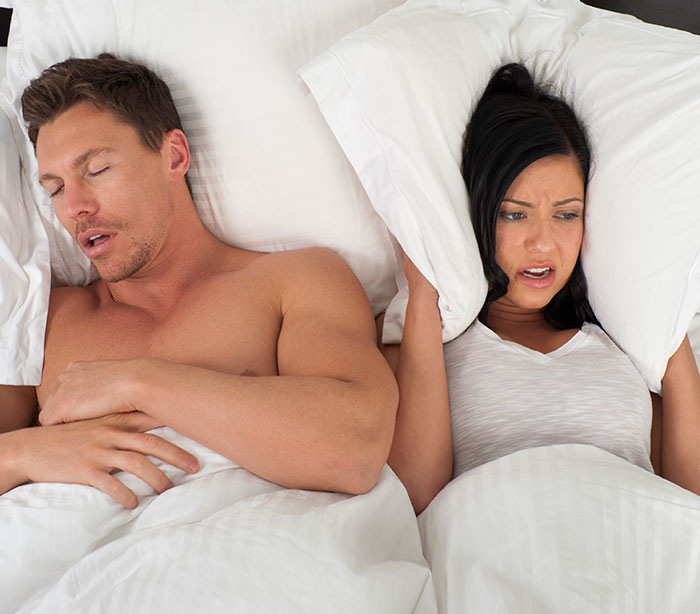Sleep apnea

Sleep Apnea – Overview & Facts
Obstructive sleep apnea is a common and serious sleep disorder that causes you to stop breathing during sleep. The airway repeatedly becomes blocked, limiting the amount of air that reaches your lungs. When this happens, you may snore loudly or making choking noises as you try to breathe. Your brain and body becomes oxygen deprived and you may wake up. This may happen a few times a night, or in more severe cases, several hundred times a night.
In many cases, an apnea, or temporary pause in breathing, is caused by the tissue in the back of the throat collapsing. The muscles of the upper airway relax when you fall asleep. If you sleep on your back, gravity can cause the tongue to fall back. This narrows the airway, which reduces the amount of air that can reach your lungs. The narrowed airway causes snoring by making the tissue in back of the throat vibrate as you breathe.
Sleep apnea can make you wake up in the morning feeling tired or unrefreshed even though you have had a full night of sleep. During the day, you may feel fatigued, have difficulty concentrating or you may even unintentionally fall asleep. This is because your body is waking up numerous times throughout the night, even though you might not be conscious of each awakening.
The lack of oxygen your body receives can have negative long-term consequences for your health. This includes:
- High blood pressure
- Heart disease
- Stroke
- Pre-diabetes and diabetes
- Depression
There are many people with sleep apnea who have not been diagnosed or received treatment. A sleep medicine physician can diagnose obstructive sleep apnea using an in-lab sleep study or a home sleep test. Sleep apnea is manageable using Continuous Positive Airway Pressure (CPAP), the front-line treatment for sleep apnea, oral appliance therapy or surgery.
Obstructive sleep apnea in adults is considered a sleep-related breathing disorder. Causes and symptoms differ for Obstructive Sleep Apnea in Children, and Central Sleep Apnea.
Symptoms
The symptom most commonly associated with sleep apnea is snoring. Not everyone who snores has sleep apnea. If snoring is paired with choking or gasping sounds, it is likely to be sleep apnea.
Daytime fatigue is another common symptom.
The symptoms of sleep apnea include:
- Loud or frequent snoring
- Choking or gasping while you sleep
- Pauses in breathing
- Morning headaches
- Excessive daytime sleepiness
- Insomnia due to difficulty staying asleep
- Waking up with dry mouth or a sore throat
- Frequent need to urinate during the night
- Trouble concentrating
- Memory or learning problems
- Moodiness, irritability or depression
Risk Factors
A common misconception is that sleep apnea only affects older, overweight men. This widely-held assumption is wrong: anyone can have sleep apnea, regardless of gender, age or body type. If you have any of the following traits you may be at increased risk:
- Excess weight – An adult with a BMI of 25 or higher is considered to be overweight. Your risk of sleep apnea increases with the amount of excess body weight.
- Large neck size (>17 inches for men, > 16 inches for women) – A large neck will have more fatty tissue that can block your airway.
- Older age (40+ for men, 50+ for women) – Sleep apnea occurs more often in older adults, especially people older than 60.
- Being male – Men have twice the risk having sleep apnea compared to women
- Smoker – Smokers have a higher risk of sleep apnea
- Hypertensive – High blood pressure is very common in people with sleep apnea
- Family history – Sleep apnea can appear more often among family members. This may be a result of either inherited traits or common lifestyles.
If you answered yes to one or more of the questions below you are at risk for sleep apnea:
- Do you experience any of these problems?
-
- Unintentionally falling asleep during the day
- General daytime sleepiness
- Unrefreshing sleep
- Fatigue
- Insomnia
-
- Do you ever wake from sleep with a choking sound or gasping for breath?
- Has your bed partner noticed that you snore loudly or stop breathing while you sleep?
Other questions you can ask yourself to determine if you are at higher risk for sleep apnea include:
- Have you ever nodded off or fallen asleep while driving?
- Do you often wake up with a headache?
- Do you have a neck size of 17 inches or more?
- Do you have a body mass index (BMI) of 25 or higher?
- Do you have high blood pressure?
- Do you have a family member who has sleep apnea?
The Epworth Sleepiness Scale is often used tell if you have daytime fatigue, a symptom of sleep apnea.
Physician’s Visit
Your pulmonologist will need to know your symptoms, and whether they began when you gained weight or stopped exercising. If you can, ask a partner or roommate or relative if they have ever heard you snore loudly or make choking noises in your sleep.
You may also need to keep a sleep diary for two weeks. This includes information about what time you went to bed each night, when you woke up in the morning and how many times you woke up each night. This will help the doctor see your sleep patterns, which could contain clues about how to diagnose and correct your sleep problem.
Your pulmonologist will also try to determine if there is something else that is causing your sleep problems or making the symptoms worse, such as:
- Another sleep disorder
- A medical condition
- Medication use
- A mental health disorder
- Substance abuse
